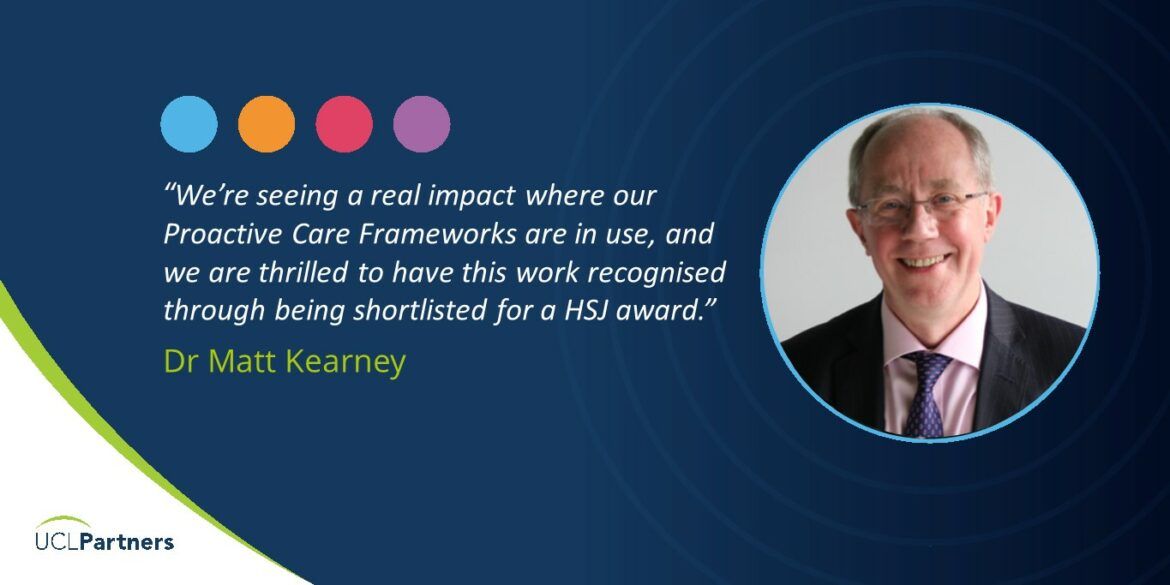UCLPartners work to help people living with long term conditions shortlisted for HSJ Award
Since 2020, we have developed a series of Proactive Care Frameworks with the aim of helping primary care to weather and emerge from the COVID pandemic stronger, able to restore and transform care for people who are living with long term conditions.
Today, more than 30 primary care networks (PCNs) across North Central London and North East London are using the Proactive Care Frameworks meaning thousands of patients are having their care guided by them.
Nationally, the Royal College of GPs has issued guidance recommending the use of our frameworks to support post-pandemic long term condition recovery. And our hypertension (high blood pressure) framework has become a core part of the National Blood Pressure Optimisation Programme, meaning all 15 Academic Health Science Networks (AHSNs) across England are now supporting the rollout of the frameworks across their regions. This is helping to reach the NHS long-term plan’s ambitious target of saving 150,000 lives – by improving management of blood pressure, cholesterol and atrial fibrillation. Our Size of the Prize initiative shows that if 80% of people with hypertension are treated effectively, in England we will prevent around 12,000 heart attacks and strokes, saving over £135 million in health care costs over three years.
Now in its 42nd year, the HSJ Awards continue to provide an opportunity to shine a light on the outstanding efforts and achievements that individuals and teams across the sector deliver on a daily basis. More than 1000 entries were submitted to this year’s awards, with 219 projects and individuals making it to the final shortlist.

HSJ editor Alastair McLellan, said: “On behalf of all my colleagues, it gives me great pleasure to congratulate UCLPartners on being shortlisted as a finalist in the category of ‘Primary and Community Care Innovation of the Year’. All of the applications represent the ‘very best of the NHS’ and often leave our esteemed panel of judges with an impossible choice!”
The UCLPartners frameworks, which focus on hypertension, type 2 diabetes, high cholesterol, atrial fibrillation, asthma, severe mental illness and chronic obstructive pulmonary disease are underpinned by risk stratification and prioritisation tools along with tactics to mobilise wider workforce. Developed by GPs and pharmacists working alongside patients and the public, the frameworks seek to optimise workforce capacity and utilise available digital resources, aiding a step change in self-management, remote support, and personalisation of care.
Evaluation by City University has found primary care staff are in favour of using the frameworks as they improve patient care and experience, and increase clinician capacity.
Some examples of how the frameworks have positively impacted on patient care and workforce capacity are:
- In Knowsley, three PCNs used the asthma framework across 11 GP practices to optimise treatment for more than 200 patients. This has reduced the practices’ number of asthma high-risk patients by 50%.
- In Haringey, five GP practices have shown that after three months of using the hypertension framework they have been able to reduce their most at risk patient cohort by 41% and their second most at risk group by 13%.
- The Lakeside PCN has demonstrated that through prioritisation, aided by the frameworks they can release enough nursing time to perform 650 additional smears.
Dr Matt Kearney, Executive Clinical Director for Cardiovascular Health at UCLPartners said: “The COVID pandemic was difficult for us all. Those working in our primary care sector experienced some of their toughest times, unable to deliver traditional care they were put under enormous strain to find new methods. Now, as we emerge from COVID the asks of them continue, with patients who had their care disrupted needing urgent help to get their long term conditions under control.
“Our frameworks aim to help those working in primary care to prioritise their efforts. Ensuring that they can identify the patients who need clinical intervention most while providing proactive care to all patients. It is through this directed aim that we can refocus, recover and transform our efforts in helping patients avoid future ill health. We’re seeing a real impact where our frameworks are in use, and we are thrilled to have this work recognised through being shortlisted for a HSJ award. The awards ceremony will take place in November – wish us luck!”